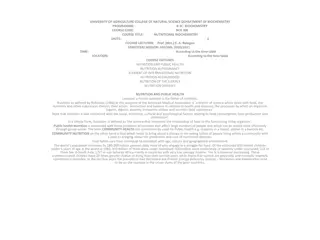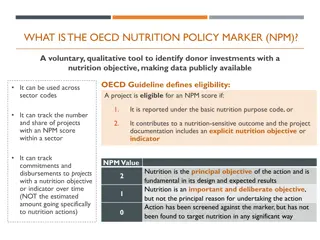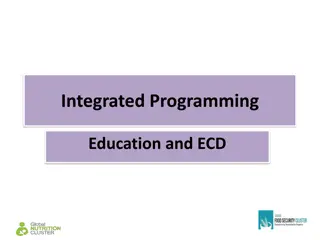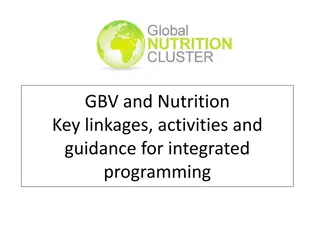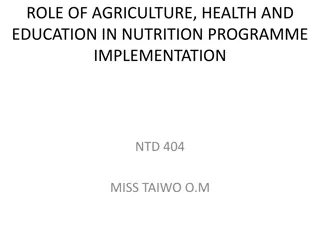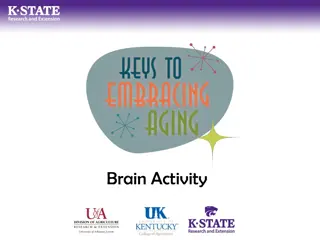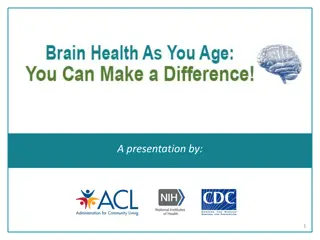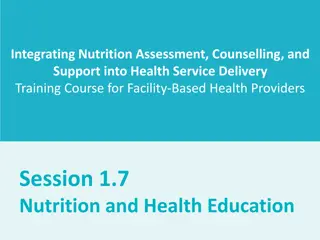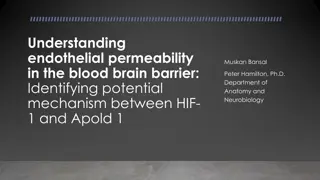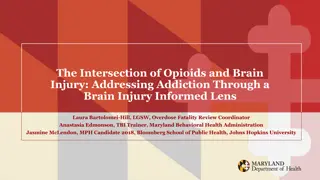The Impact of Nutrition on Brain Health and Well-being
Explore how nutrition plays a crucial role in brain health and overall well-being, affecting mood, behavior, and cognitive function. Discover the importance of macronutrients, micronutrients, and antioxidants in supporting brain health and preventing degenerative conditions. Consider the evolution of food consumption and its effects on our bodies, highlighting the significance of a balanced diet for optimal brain function.
Download Presentation

Please find below an Image/Link to download the presentation.
The content on the website is provided AS IS for your information and personal use only. It may not be sold, licensed, or shared on other websites without obtaining consent from the author.If you encounter any issues during the download, it is possible that the publisher has removed the file from their server.
You are allowed to download the files provided on this website for personal or commercial use, subject to the condition that they are used lawfully. All files are the property of their respective owners.
The content on the website is provided AS IS for your information and personal use only. It may not be sold, licensed, or shared on other websites without obtaining consent from the author.
E N D
Presentation Transcript
Setting up for Success An integrated approach to well being (continued) Daniela Morse M.Ed. May 14th 2020 1
Safety/ Security Support/ Social Connection Nutrition Purpose/ Contribution Stress Balance Physical Health Sleep Toxins/ Environment Sensory 2 Daniela Morse, M.Ed. 2020
Nutrition and the Brain Brain cells are the body s largest cells, have high energy and nutrient needs, and are susceptible to damage Fragile and sensitive to toxins such as aluminum, lead, pesticides, MSG, aspartame, food preservatives, and food additives Over time poor nutrition can alter brain chemistry and nerve function affecting mood, sleep patterns, and thinking 3
Nutrition and Mood Takes years of non-nutritious eating to experience physical health consequences Our mental and emotional health are immediately affected poor mood or behavior may be the first signs of a nutritional deficiency 4
For thousands & thousands of years, Our ancestors ate berries, fish, grains, vegetables, and meat In the last 100 years, twinkies, spam, hot dogs, donuts, pizza, and soda Food has changed dramatically! Have we evolved to be able to cope/digest the new food ? 5
Brain Moisture = Nutritional parts +++ Fats/lipids Omega 3 & 6 Must come from diet Prevent degenerative brain conditions Building block for neurotransmitters How we feel and behave Proteins Micronutrients Antioxidants Fight radical production B6 B12 Zinc, copper, sodium Amino Acids Glucose (fuel/carbs) 6 https://www.ted.com/talks/mia_nacamulli_how_the_food_you_eat_affects_your_brain/transcript?language=en
Macronutrients Foods we need in larger quantities (grain range) also called energy nutrients (with the exception of water) as they provide our body and brains with energy. While the brain is only 2% of our body weight, it consumed 20% of our energy. Energy is measured in calories needed to grow, repair, regulate life processes 3 main Macronutrients are Carbohydrates, Fats, and Proteins 7 https://avitahealth.org/health-library/macronutrients-a-simple-guide-to-macros/
Carbohydrates Carbs are for brain energy Complex (non refined) carbs 20% The brain cannot store energy and requires a steady stream of it, usually in the form of glucose Complex carbs, the kind found in unprocessed plant foods, give brains the energy they need Carbs increase the bloods ability to carry oxygen to brain and keep glucose stable. STRATEGY: eating of complex carbs without protein will maintain the necessary level of mood boosting neurotransmitters/serotonin. Regular consumption of white sugar and other refined carbs leads to chronic high blood sugar and can shrink your brain, causing memory loss and Alzheimer s. Brian energy foods are: potatoes, grains, carrots, beets, and winter squash 8 https://bebrainfit.com/brain-nutrients/
Fats Not all fats are bad Good fats are vital for healthy bodies and minds People who consume a diet low in fat and particularly cholesterol are at risk for depression and suicide (Psychology Today, The Risk of Low Fat Diets by Hara Estrof Marano) Serotonin suppresses impulses and keeps them in check. If the Serotonin system does not work, it can result in an impulsive act, suicide, or hostility People who have high cholesterol, have a 70% reduction of risk of dementia Unhealthy Trans Fats: like Canola, safflower, and soy cause inflammation, increase risk of depression up to 50% Healthy Fats: Avocados, olives, nuts, seeds, grass fed butter, fatty fish (salmon, tuna, mackerel) 9 https://bebrainfit.com/brain-nutrients/
Proteins (Amino Acids) Facilitate body growth Builds and repairs tissue Assists with production of dopamine and serotonin Tryptophan (turkey) = mood boosting! Low levels have been linked to depression, anxiety, & memory loss STRATEGY: dairy products, poultry, tuna, oatmeal, spinach, green leafy vegetables, sea vegetables, soy beans, cauliflower, asparagus 10 https://bebrainfit.com/brain-nutrients/
Micronutrients include vitamins, minerals, and antioxidants are nutrients that our bodies need in small amounts. However, if they are missing, our brain health can be significantly impacted . 11 https://bebrainfit.com/brain-nutrients/
Food and your mood Nutrient Impact on Mood Source Carbohydrate Produces a sense of calm 100% whole grain bread and cereal, potatoes, beans, peas, and corn Lean meat, fish, poultry, low-fat or fat- free dairy, eggs, beans, and nuts Salmon, sardines, mackerel, herring, flax seeds, and walnuts Sweet potatoes, spinach, carrots, and fortified cerea Fortified cereal and soy products, potatoes, and chickpeas Clams, oysters, fish, lean meat, poultry, low-fat or fat-free dairy, and fortified cerea Protein Enhances alertness and boosts motivation Quiets cravings and induces calm Impacts learning and memory development Improves memory and concentration Regulates mood, controls emotions, and improves sleep Omega-3 Fatty Acid Vitamin A Vitamin B6 Vitamin B12 12 https://www.med.navy.mil/sites/nmcphc/Documents/health-promotion- wellness/ShipShape/StressManagementAndRelaxation_Food%20and%20Mood.pdf
Food and your mood (continued) Nutrient Impact on Mood Source Folate Prevents depressed mood Broccoli, spinach, collard, 100% whole grains, and fortified cereal Oranges, kiwi, strawberries, broccoli, tomatoes, and red and green peppers Sunlight, fatty fish, eggs, fortified milk, juice, and cereal Milk, yogurt, cheese, kale, and fortified dairy alternatives (soy milk) Lean beef, eggs, beans, and fortified cereal Oat bran, brown rice, and almonds Vitamin C Minimizes mood changes and boosts energy Eases depressive symptoms Vitamin D Calcium Reduces anxiety and irritability and improves sleep Fights fatigue, irritability, and mood swings Inhibits depression, psychosis, and muscle weakness Controls mood and prevents depression Iron Magnesium Potassium Potatoes, bananas, yogurt, tuna, and soy 13 https://www.med.navy.mil/sites/nmcphc/Documents/health-promotion- wellness/ShipShape/StressManagementAndRelaxation_Food%20and%20Mood.pdf
Magnesium The Original Chill Pill or Nature s Valium Essential mineral of human health mineral is needed for over 300 biochemical metabolic operations and plays a role in everything from energy production to improved mental health, blood sugar, heart health, healthy bones, and muscle function. 14 https://wholefoodsmagazine.com/supplements/features-supplements/magnesium-natures-chill- pill/
Magnesium The Original Chill Pill or Nature s Valium (continued) The current RDA for adults is between 320 and 420mg daily, and the average US intake is around 250mg daily. In 1968, Wacker & Parisi reported that magnesium deficiency could cause depression, behavioral disturbances, headaches, muscle cramps, seizures, ataxia, Psychosis, and irritability - all reversible with magnesium repletion. 15 https://www.psychologytoday.com/us/blog/evolutionary-psychiatry/201106/magnesium- and-the-brain-the-original-chill-pill
Magnesium The Original Chill Pill or Nature s Valium (continued) Stress causes Magnesium to be sequestered and wasted during times of stress and is not replenished without adequate food intake Stress- excess in cortisol eventually damages the hippocampus depression and neurotoxicity Magnesium regulates the stress response reducing the release of ACTH (hormone that activates adrenal fight or flight) Magnesium can act as a blood brain barrier and embrace stress hormones into the brain (filter) Magnesium boosts serotonin (satisfaction, relaxation, sleep, depression, eating disorders, insomnia) Studies show correlation between levels of magnesium & seritonin 16
Foods High in Magnesium Almonds Spinach Cashews Soy milk Chick peas Black beans Avocado Whole grain bread Sunflower seeds Mineral water (San Pelligrino, Fuji, Evian) Dark chocolate Figs Real peanut butter Salmon & Marckerel Cabbage Broccoli raspberries 17
Magnesium decreases with: Processed foods Antacids Excessive caffeine Alcohol Chronic stress Diet high in sodium Vitamin D deficiency Type 2 Diabetes Renal/GI complications Long term antibiotics Too much protein intake 18
Happy Vitamins B Vitamins are often called the Anti Stress or Happy Vitamins because they can boost mood and increase stress tolerance. B12 is one of the most common vitamin deficiencies (in the US, an estimates 48% of adults are vitamin B12 deficient) Vitamin B deficiencies can cause memory loss, dementia, depression, and anxiety by triggering symptoms in the nervous system and red blood cells. Studies show that high Vitamin B12 leads to better treatment outcomes in depression Theory B12 Serotonin connection You can find Vitamin B in animal organ meats (liver and kidney), clams, sardines, beef, tuna, trout, salmon, milk/dairy, eggs, and ham 19
Neurotransmitters are synthesized in the gut and brain including dopamine, GABA, and Serotonin. 95% of Serotonin comes from the gut! 20
21 https://www.deannaminich.com/eating-for-your-neurotransmitters/
Food Additives to Avoid Sodium nitrate: Added to processed meats to stop bacterial growth. Linked to cancer in humans. (Worst Offender) Sulfites: Used to keep prepared foods fresh. Can cause breathing difficulties in those sensitive to the ingredient. Azodicarbonamide: Used in bagels and buns. Can cause asthma. Potassium bromate: Added to breads to increase volume. Linked to cancer in humans. Propyl gallate: Added to fat-containing products. Linked to cancer in humans BHA/BHT: A fat preservative, used in foods to extend shelf life. Linked to cancerous tumor growth. Propylene glycol: Better known as antifreeze. Thickens dairy products and salad dressing. Deemed generally safe by FDA. Butane: Put in chicken nuggets to keep them tasting fresh. A known carcinogen. Monosodium glutamate (MSG): Flavor enhancer that can cause headaches. Linked in animal studies to nerve damage, heart problems and seizures. 10. Disodium inosinate: In snack foods. Contains MSG. 11. Disodium guanylate: Also used in snack foods, and contains MSG. 12. Enriched flour: Used in many snack foods. A refined starch that is made from toxic ingredients. 13. Recombinant Bovine Growth Hormone (rBGH): Geneticially-engineered version of natural growth hormone in cows. Boosts milk production in cows. Contains high levels of IGF-1, which is thought cause various types of cancer. 1. 2. 3. 4. 5. 6. 7. 8. 9. 22 https://mphprogramslist.com/50-jawdroppingly-toxic-food-additives-to-avoid/
Food Additives to Avoid (continued) Refined vegetable oil: Includes soybean oil, corn oil, safflower oil, canola oil, and peanut oil. High in omega-6 fats, which are thought to cause heart disease and cancer. Sodium benzoate: Used as a preservative in salad dressing and carbonated beverages. A known carcinogen and may cause damage our DNA. Brominated vegetable oil: Keeps flavor oils in soft drinks suspended. Bromate is a poison and can cause organ damage and birth defects. Not required to be listed on food labels. Propyl gallate: Found in meats, popcorn, soup mixes and frozen dinners. Shown to cause cancer in rats. Banned in some countries. Deemed safe by FDA. Olestra: Fat-like substance that is unabsorbed by the body. Used in place of natural fats in some snack foods. Can cause digestive problems, and also not healthy for the heart. Carrageenan: Stabilizer and thickening agent used in many prepared foods. Can cause ulcers and cancer. Polysorbate 60: A thickener that is used in baked goods. Can cause cancer in laboratory animals. Camauba wax: Used in chewing gums and to glaze certain foods. Can cause cancer and tumors. Magnesium sulphate: Used in tofu, and can cause cancer in laboratory animals. 1. 2. 3. 4. 5. 6. 7. 8. 9. 10. Chlorine dioxide: Used in bleaching flour. Can cause tumors and hyperactivity in children. 11. Paraben: Used to stop mold and yeast forming in foods. Can disrupt hormones in the body, and could be linked to breast cancer. 12. Sodium carboxymethyl cellulose: Used as a thickener in salad dressings. Could cause cancer in high quantities. 13. Aluminum: A preservative in some packaged foods that can cause cancer. 23 https://mphprogramslist.com/50-jawdroppingly-toxic-food-additives-to-avoid/
Artificial Sweeteners to Avoid 1. Saccharin: Carcinogen found to cause bladder cancer in rats. (Worst Offender) Aspartame: An excitotoxin and thought to be a carcinogen. Can cause dizziness, headaches, blurred vision and stomach problems. High fructose corn syrup: Sweetener made from corn starch. Made from genetically- modified corn. Causes obesity, diabetes, heart problems, arthritis and insulin resistance. Acesulfame potassium: Used with other artificial sweeteners in diet sodas and ice cream. Linked to lung and breast tumors in rats. Sucralose: Splenda. Can cause swelling of liver and kidneys and a shrinkage of the thymus gland. Agave nectar: Sweetener derived from a cactus. Contains high levels of fructose, which causes insulin resistance, liver disease and inflammation of body tissues. Bleached starch: Can be used in many dairy products. Thought to be related to asthma and skin irritations. Tert butylhydroquinone: Used to preserve fish products. Could cause stomach tumors at high doses. 2. 3. 4. 5. 6. 7. 8. 24 https://mphprogramslist.com/50-jawdroppingly-toxic-food-additives-to-avoid/
Aspertane Neurological symptoms include: Decreased serotonin & dopamine production Learning problems Headaches Seizures Migraines Mood fluctuations Anxiety Depression Insomnia 20% of US population consume diet drinks on a given day 25 https://www.cdc.gov/nchs/products/databriefs/db109.htm
Artificial Food Colorings to Avoid Red #40: Found in many foods to alter color. All modern food dyes are derived from petroleum. A carcinogen that is linked to cancer in some studies. Also can cause hyperactivity in children. Banned in some European countries. (Worst Offender) Blue #1: Used in bakery products, candy and soft drinks. Can damage chromosomes and lead to cancer. Blue #2: Used in candy and pet food beverages. Can cause brain tumors Citrus red #1: Sprayed on oranges to make them look ripe. Can damage chromosomes and lead to cancer. Citrus red #2: Used to color oranges. Can cause cancer if you eat the peel. Green #3: Used in candy and beverages. May cause bladder tumors. Yellow #5: Used in desserts, candy and baked goods.Thought to cause kidney tumors, according to some studies. Yellow #6: A carcinogen used in sausage, beverages and baked goods. Thought to cause kidney tumors, according to some studies. Red #2: A food coloring that may cause both asthma and cancer. Red #3: A carcinogen. that is added to cherry pie filling, ice cream and baked goods. May cause nerve damage and thyroid cancer. Caramel coloring: In soft drinks, sauces, pastries and breads. When made with ammonia, it can cause cancer in mice. Food companies not required to disclose if this ingredient is made with ammonia. Brown HT: Used in many packaged foods. Can cause hyperactivity in children, asthma and cancer. Orange B: A food dye that is used in hot dog and sausage casings. High doses are bad for the liver and bile duct. Bixin: Food coloring that can cause hyperactivity in children and asthma. Norbixin: Food coloring that can cause hyperactivity in children and asthma. Annatto: Food coloring that can cause hyperactivity in children and asthma. 26 https://mphprogramslist.com/50-jawdroppingly-toxic-food-additives-to-avoid/
Sleep A restorative, biologically regulated state which replenishes the system on all levels including cellular, endocrine, immune, metabolic, physical, and emotional. 27
Our brains are hard at work while we sleep. During deep sleep we produce: Nerve growth factor Growth hormone Serotonin Digestive chemistry Stress chemistry 28
Sleep Deprivation 1 night without sleep; causes changes in brainwaves and more susceptible to having a seizure 3 nights without sleep; psychological changes including auditory and visual hallucinations and paranoid states 1 week without sleep = DEATH 29
Factors Positively Impact Sleep Sleep hygiene Sleep routines doing the same routine at the same time Exercise 4 to 5 hours before bedtime Sunshine in early afternoon Stress reduction/calming activities Appropriate environments Adequate and balanced nutrition Healthy immune system state Self-regulatory ability 30
END 31







